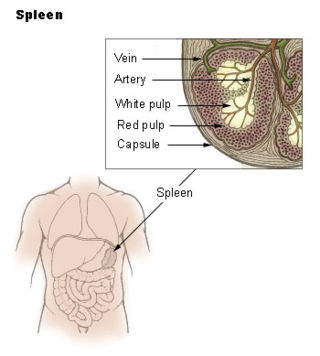Hypochondriac may refer to:
- Hypochondriac (The Frights album), 2018
- Hypochondriac (Brakence album), 2022
- "Hypochondriac", a 2020 song by Fenne Lily
Hypochondriac may refer to:

The spleen is an organ found in almost all vertebrates. Similar in structure to a large lymph node, it acts primarily as a blood filter. The word spleen comes from Ancient Greek σπλήν (splḗn).
Ha may refer to:
"Escape Clause" is episode six of the American television anthology series The Twilight Zone. It is "the story of a strange contract between a mortal man and his most satanic majesty"; it originally aired on November 6, 1959, on CBS.

Hypochondriasis or hypochondria is a condition in which a person is excessively and unduly worried about having a serious illness. Hypochondria is an old concept whose meaning has repeatedly changed over its lifespan. It has been claimed that this debilitating condition results from an inaccurate perception of the condition of body or mind despite the absence of an actual medical diagnosis. An individual with hypochondriasis is known as a hypochondriac. Hypochondriacs become unduly alarmed about any physical or psychological symptoms they detect, no matter how minor the symptom may be, and are convinced that they have, or are about to be diagnosed with, a serious illness.
Chilly may refer to:
Doctor shopping is the practice of visiting multiple physicians to obtain multiple prescriptions. It is a common practice of people with substance use disorders, suppliers of addictive substances, hypochondriacs or patients of factitious disorder and factitious disorder imposed on another. A doctor who, for a price, will write prescriptions without the formality of a medical exam or diagnosis is known as a "writer" or "writing doctor".

Flight of the Wounded Locust is a 7-inch EP by American noise rock band The Locust. It was released in 2001 on Gold Standard Laboratories. Flight of the Wounded Locust was also the band's final recording as a five-piece.
Medical students' disease is a condition frequently reported in medical students, who perceive themselves to be experiencing the symptoms of a disease that they are studying.
Alcohol most commonly refers to:
Let It Be most commonly refers to:

In anatomy, the division of the abdomen into regions can employ a nine-region scheme. The hypochondrium refers to the two hypochondriac regions in the upper third of the abdomen; the left hypochondrium and right hypochondrium. They are located on the lateral sides of the abdominal wall respectively, inferior to (below) the thoracic cage, being separated by the epigastrium.
Melman or variant, may refer to:
The obsessive–compulsive spectrum is a model of medical classification where various psychiatric, neurological and/or medical conditions are described as existing on a spectrum of conditions related to obsessive–compulsive disorder (OCD). "The disorders are thought to lie on a spectrum from impulsive to compulsive where impulsivity is said to persist due to deficits in the ability to inhibit repetitive behavior with known negative consequences, while compulsivity persists as a consequence of deficits in recognizing completion of tasks." OCD is a mental disorder characterized by obsessions and/or compulsions. An obsession is defined as "a recurring thought, image, or urge that the individual cannot control". Compulsion can be described as a "ritualistic behavior that the person feels compelled to perform". The model suggests that many conditions overlap with OCD in symptomatic profile, demographics, family history, neurobiology, comorbidity, clinical course and response to various pharmacotherapies. Conditions described as being on the spectrum are sometimes referred to as obsessive–compulsive spectrum disorders.
Nosophobia, also known as disease phobia or illness anxiety disorder, is the irrational fear of contracting a disease, a type of specific phobia. Primary fears of this kind are fear of contracting HIV infection, pulmonary tuberculosis (phthisiophobia), sexually transmitted infections, cancer (carcinophobia), heart diseases (cardiophobia), and catching the common cold or flu.
Somatosensory amplification (SSA) is a tendency to perceive normal somatic and visceral sensations as being relatively intense, disturbing and noxious. It is a common feature of hypochondriasis and is commonly found with fibromyalgia, major depressive disorder, some anxiety disorders, Asperger syndrome, and alexithymia. One common clinical measure of SSA is the Somatosensory Amplification Scale (SSAS).
Heavy legs is a condition described as an unpleasant sensation of pain and heaviness in the lower limbs. Symptoms include legs feeling weighted, stiff, and tired.

Supercondriaque is a 2014 French comedy film written and directed by Dany Boon.

The Frights are an American surf punk band formed in Poway, California, in 2012. Since 2017, the band has consisted of Mikey Carnevale, Richard Dotson, Marc Finn (drums) and Jordan Clark.
Giovanni Andrea Fava is an Italian psychiatrist and former professor of clinical psychology at the University of Bologna. He is also a clinical professor of psychiatry at the University at Buffalo School of Medicine and Biomedical Sciences.

Hypochondriac is the third studio album by American surf-punk band the Frights, released August 24, 2018 on Epitaph Records.